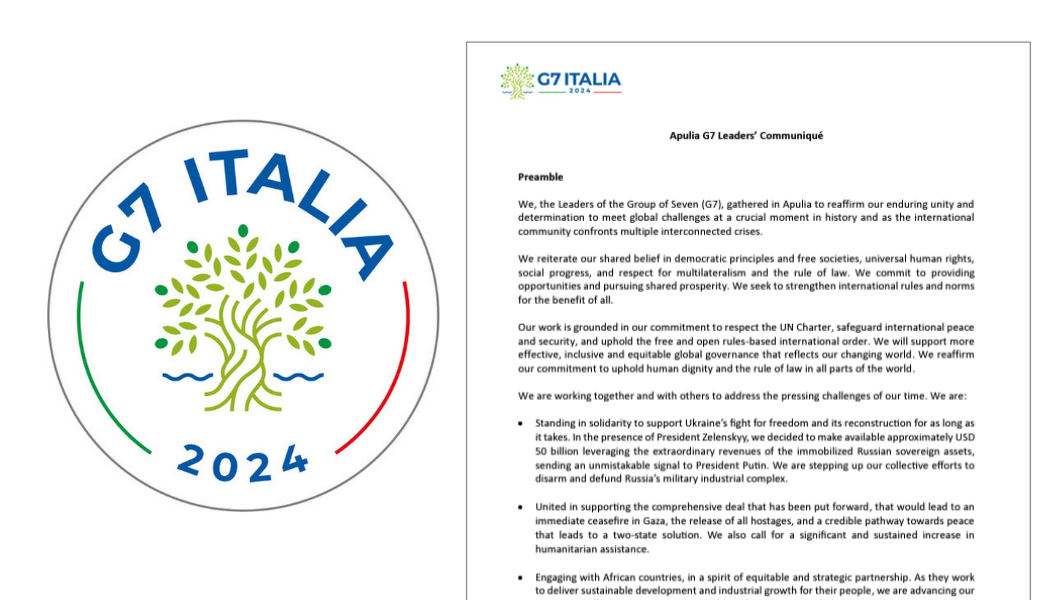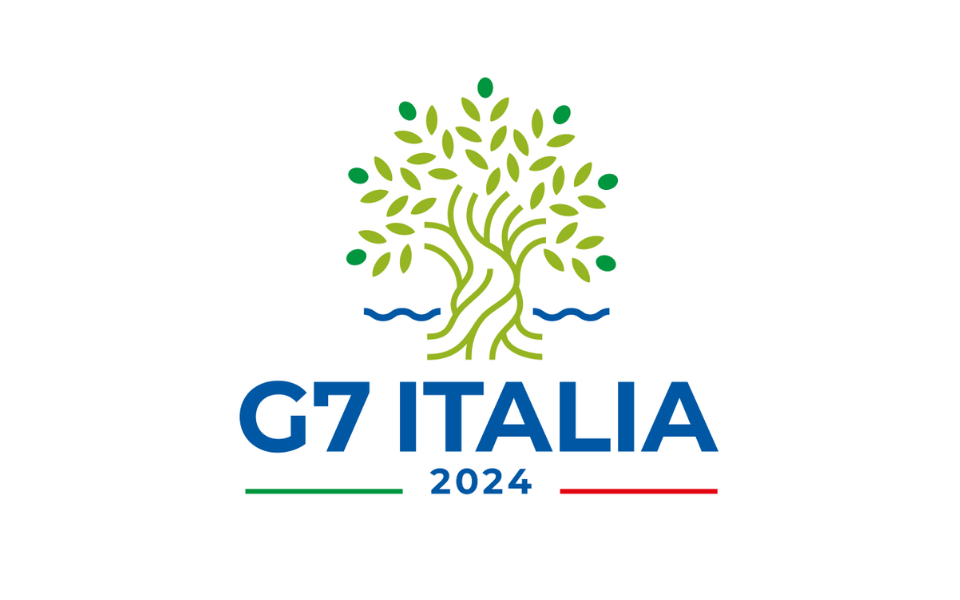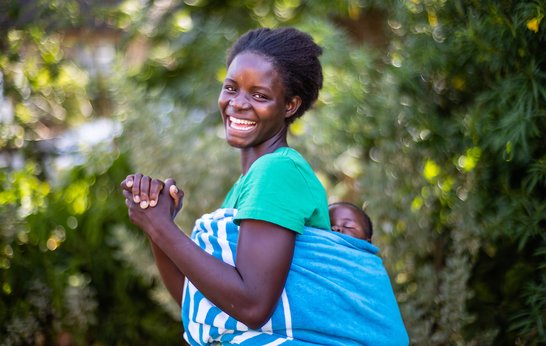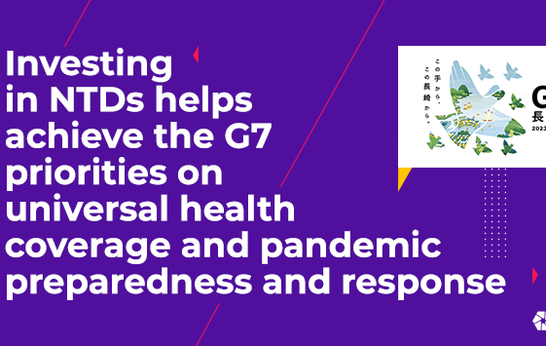With the 50th G7 Leaders’ Summit in Puglia, Italy concluding last week (13-14 June 2024), it was brilliant to see neglected tropical diseases (NTDs) language included within the leaders’ communiqué for the third consecutive year. In this article, we share how national NTD coalitions supported by Uniting to Combat NTDs engaged in the G7 process to ensure that NTDs were included at this global level, and look at what this means for global health and NTDs.
Active engagement with C7
A key engagement moment as part of the G7 process is the dialogue with interested parties, called Engagement Groups. Civil 7, or C7, is one of the official Engagement Groups of the G7, allowing international civil society to address critical global policy concerns and put their recommendations on issues to the governments of the G7 through a joint communiqué, presented to the G7 sherpas and leads of ministerial meetings.
This year, the national NTD coalitions of the Canadian Network for Neglected Tropical Diseases (CNNTDs) and the German Network against Neglected Tropical Diseases (DNTDs) led the partner engagement in this process, and successfully secured language in the Global Health section of the C7 communiqué alongside partners released at the C7 Summit in May, with two references to NTDs in the C7 recommendations:
- End AIDS, Tuberculosis, and Malaria, as well as polio and Neglected Tropical Diseases (NTDs) and other major epidemics. Make ambitious commitments to fully fund the upcoming replenishments of The Global Fund, Global Financing Facility (GFF) and Gavi.
- Prioritise health promotion and preventative public health measures (including WASH, good nutrition, vaccinations, mass drug administration (MDA), HIV pre-exposure prophylaxis, screening programs and early diagnosis and treatment) to avoid and reduce the impact of NCDs, mental health, dementia, NTDs and other infectious diseases, and to promote healthy ageing.
Watch this video from the Network Italiano Salute Global (Global Health Italian Network) to hear from some global health advocates on what they would like to see more of from G7 leaders, including more funding and prioritisation of the prevention and treatment of NTDs:
In the lead-up to the G7 Leaders’ Summit
Alongside this engagement, national NTD coalitions across all G7 member states put together a joint letter, calling on G7 leaders to financially commit 1% of global health aid to NTD programmes, and highlighting how NTDs relate to several cross-cutting global priorities. Delivered to G7 Sherpas and published in key title Politics Home, this was signed by CNNTDs, the Francophone Network on Neglected Tropical Diseases, DNTDs, the Italian Network Against Neglected Tropical Diseases, SDG Promise Japan, the United Kingdom’s Coalition Against Neglected Tropical Disease, the United States’ Neglected Tropical Disease Roundtable, and Uniting to Combat NTDs.
CNNTDs also engaged further with Canadian press, calling on G7 leaders for durable commitments to end NTDs, with Advocacy and Policy Officer at CNNTDs Tina Lines quoted saying:
“No one should die from or live with preventable and treatable diseases like NTDs. G7 leaders can make a difference in the lives of some of the world’s most forgotten people by investing in NTDs.”
The G7 Leaders’ communiqué – what does it mean for NTDs?

G7 leaders then met in Puglia for the annual Summit on 13-14 June 2024 to discuss and agree how to meet the global challenges of this moment.
Though this was dominated by geo-political concerns, such as the ongoing conflict in Ukraine and China’s growing stature in the world, some important commitments were made with regards to global health and development. At the end of the Summit, leaders produced the G7 Leaders’ Communiqué which outlines what has been agreed, and concrete steps they will take on key issues.
Within the communiqué, we were pleased to see NTDs specifically mentioned as G7 leaders “recommit to ending HIV, tuberculosis, malaria…, neglected tropical diseases and polio as public health threats by 2030.”
G7 Leaders also acknowledged the importance of “countering climate change effects on infectious diseases”, citing the NTD dengue as a specific example. The objectives of the COP28 Declaration on Climate and Health were reaffirmed, notably the need for health systems to be climate-resilient, which is key to respond to the shifting disease risk that we are beginning to see as a result of climate change.
G7 leaders reaffirmed their commitments to the One Health approach and achieving Universal Health Coverage (UHC) as well as accelerating progress towards SDG 3, ensuring healthy lives and promoting healthy lives and promoting wellbeing for all at all ages. Within their commitment to advancing UHC and investing in resilient health systems, leaders committed to “further promote comprehensive sexual and reproductive health and rights (SRHR) for all, and to advance maternal, newborn, child, and adolescent health, especially for those in vulnerable circumstances.” The scope and access of NTD programmes to some of the world’s poorest communities are a gateway to achieving UHC and an indicator for equity. Investments in NTD programmes expand access to health services to hard-to-reach populations and frees up capacity to address other health issues. We need to ensure funding for NTDs is part of any UHC commitments.
We were also interested to see language on “strengthening the Global Health Architecture and Pandemic Preparedness and Response (PPR)”. The G7 called on continued support for the Pandemic Fund, including “expanding the donor base and calling for at least US$2 billion in new pledges and co-financing.” Investing in fighting ongoing epidemics – including NTDs, malaria, HIV, and TB – is critical to strengthening the world’s capacity to prepare for future pandemics, and we commend the G7 for calling for further funding.
Included in the communiqué in relation to PPR was a commitment of strengthening G7 collaboration to support localisation of vaccine manufacturing. We support an agenda to develop a sustainable, local manufacturing industry, particularly on the African continent. Stronger local production would mean more equitable access to life-saving health products in the fight to beat NTDs.
We were particularly pleased to see a commitment to the importance of continuing to provide concessional financial support to low-income countries, through the call “to support a successful International Development Association (IDA21) replenishment.” We believe IDA21 offers a great opportunity to accelerate progress on NTDs, and we are advocating for disease elimination to be a flagship initiative of IDA21 with a dedicated funding stream established under the health track. This will allow countries to finance the disease elimination agenda including NTDs, malaria, meningitis, hepatitis B etc. whilst alleviating poverty, boosting economic growth, and improving living conditions for millions of people.
We would like to thank partners, particularly the national NTD coalitions, for their tireless work to include NTDs in global agendas like G7. By building political will and investing in NTDs, we can help to deliver many of the G7 commitments and beat NTDs once and for all.



